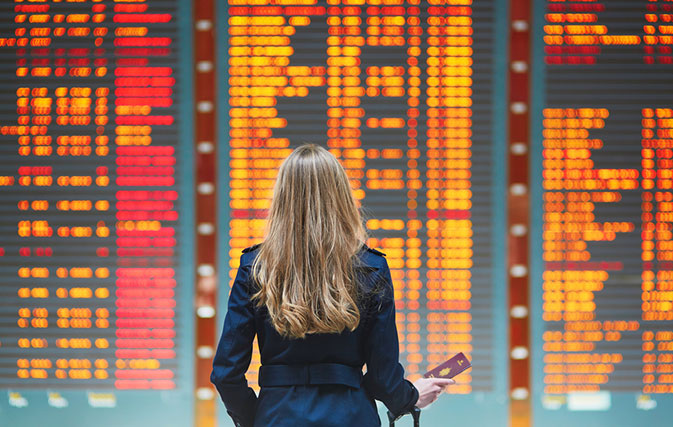TORONTO — So many travel advisors get into this industry to help make travel dreams come true – but what happens when those dreams are dashed because of cancelled flights?
It’s a nightmare, especially for travel agents, who are stuck in the middle as they work with airlines and suppliers to get their clients travelling again, while advising clients on how to proceed.
First, the good news: the number of cancelled flights has vastly improved in recent weeks compared to the start of the spring and summer travel season (see below for the latest figures from the federal government).
Among the airlines providing stats, in early August Air Canada reported a 77% reduction in the number of cancelled flights, compared to late June. Flight completion – the percentage of all scheduled flights that are not cancelled – reached 96.7%. Meanwhile WestJet, on Aug. 31, reported that its flight completion rate for Aug. 23 – 28 hit 98.9%.
While there’s no doubt air travel is getting its momentum back at this point in the pandemic, cancellations are still an issue.
And the bad news is that concern about cancellations is undermining the sales process, says one travel advisor.
“WE HAVE NO CONFIDENCE SELLING ANYTHING TIED TO AIRFARE”
Travelweek checked in with Heidi Hurst, who’s based in Calgary with her travel agency Heidiway, to find out how she’s navigating air bookings at this point in the pandemic.
The industry got to know Hurst when she launched a Commission Recall Petition back in December 2020. Hurst’s petition got thousands of signatures and was a contributing factor – along with massive advocacy efforts by ACTA, ACITA and others – to ensuring protection for travel agent commission when Canada’s airlines, starting with Air Canada in April 2021, opened up COVID-19 refunds.
As wonderful as it is to have air travel back, cancellations are wreaking havoc with client confidence.
Hurst tells Travelweek: “We have no confidence in selling anything tied to airfare and are telling travellers what they buy is probably NOT what they’ll fly. This is extremely frustrating. Can you imagine buying a car and getting told that you might drive away with a different one than you bought?”
She adds: “The consumer aspect of this with no compensation or service recovery offered aside from rebooking (sometimes days out) is nightmarish. It has definitely forced the use of international carriers and an ‘anything but YYZ’ attitude.”
Hurst says she also sees “very little sympathy for the industry among travellers. Since the media attention around the industry scrambling for assistance in the previous years was so decidedly front and centre of pandemic news, our travellers are really saying that they expect us all to have our ducks in a row for them now that they can and will spend their travel dollars.”
She adds: “This CANNOT happen for the Christmas season. There has to be a way of only adding lift when they know they can staff it. For an industry that relies on long-term planning, we’ll have to get better at our short game.”
Hurst also spoke about her take on the Transport Committee hearings into Canada’s airport chaos. The first go-round was Aug. 19, with more to come.
“We understand that not all workers came back from the pandemic and that there is a gap in recruitment and training. However, I am hesitant to request a rush for safety reasons,” she says.
“I’m not certain what the government can do. I don’t think any of us want rules relaxed that might cause other issues. Maybe a wage subsidy for returning airport workers. Which might assist the airports in getting staff.
“I think there also has to be a different approach to how we staff airports and flights. There’s no use having all the pilots and attendants in the sky with nobody on the ground. Do the wages and workplace cultures entice the right people? Where is the benefit of longevity for staff?
“Maybe by not allowing the airline to say this is ‘out of their control’, the financial incentive for them to pay out consumers or make staff remuneration more attractive might have them invest more in the latter.”
LATEST AIR TRAVEL STATS FROM THE GOVT.
The federal government’s latest update on air travel and airports, issued Sept. 1, shows that for the week of Aug. 22-28, 2022, 97.5% of flights planned for Canada’s top four airports were completed (i.e., not cancelled), an improvement from 95% for the first week of July.
Over 86% of flights from the top four airports left on time Aug. 22 – 28, or within one hour of their scheduled departure. The government notes that this is a significant improvement from under 75% for the first week of July and is approaching the pre-pandemic levels in August 2019 where 95% of flights were on time, or within an hour of scheduled departure.
The number of arriving international flights being held on the tarmac at Toronto-Pearson International Airport has decreased dramatically since May, according to the stats. For the week of Aug. 22 – 28, 2022, 5%, or 109 international flight arrivals, were held on the tarmac, as compared to the peak of 373 during the first week of May.
From Aug. 22 – 28, 2022, 87% of passengers at the four largest airports were screened within 15 minutes by CATSA, an improvement from 79% during the first week of July 2022.
The government’s update includes a reminder that starting next week on September 8, 2022, new regulations will come into effect that will ensure that passengers are offered the option of a refund for flights that are cancelled, or where there is a lengthy delay, due to reasons outside of an air carrier’s control (such as major weather events, or a pandemic) where it is not possible for the air carrier to complete the passenger’s itinerary within a reasonable time frame.

